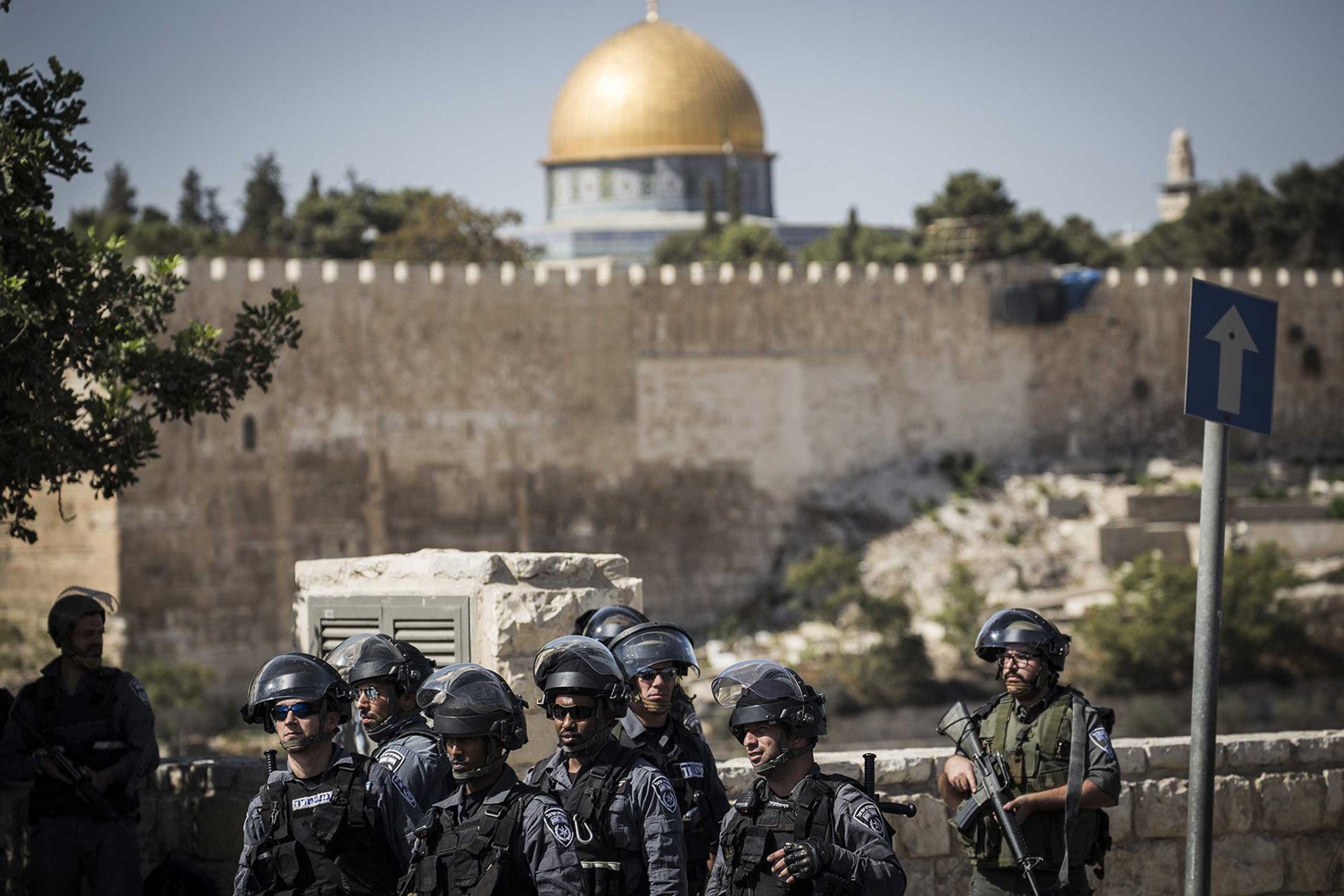
On a corner just outside the main market in West Jerusalem, a group of young Israeli men in jeans and t-shirts stand next to an ice cream freezer, two of them casually holding rifles.
“We came to eat, to go out,” says one, who asked to be called David. David and his friends are currently serving their mandatory army service and are not permitted to talk to the media. “We’re not scared.”
“We have weapons,” adds Allon, putting his hand on the M4 assault rifle hanging over his shoulder.
Seven Israelis have been killed in a spasm of violence this month that has also seen more than 30 Palestinians killed. Much of the violence has been in Jerusalem, but on Friday this city was relatively calm. While shopkeepers and restaurants employees say the numbers of Israelis out in the markets and malls is much fewer than a typical Friday afternoon, most of those that are here say they are not scared.
MORE: Violence Beats Politics as a Third Intifadeh Looms in Israel
“You see the people. They are buying, making their shopping,” says Shy Zaken as he buys snacks in a grocery store in the central Mahane Yehuda market. “It’s not full, but it’s okay.”
Despite the recent tensions in the Old City, hundreds of Israelis headed to the Western Wall, also called the Kotel, the holiest site in Judaism.
“I’m going now to the holy wall, the Kotel, to pray,” says Asher Armon as he walks toward the gates of the old city. “We trust in God. … I don’t think there have been any more stabbing by the Kotel or anywhere else today.”
But their confidence may have more to do with the thousands of Israeli security forces deployed across the city in recent days. Israeli soldiers stand guard every hundred or so feet near the old city.
Palestinian men under 40 years of age prayed on the street outside the Old City, forbidden Friday from entering the Al-Aqsa compound that is one of Islam’s holiest sites. They were watched by dozens of Israeli security forces, some on horseback.
“They closed all around Jerusalem. That’s why you don’t see many people,” says Ahmed Abdullah after the prayers. Some Palestinian neighborhoods in East Jerusalem are on lock down, the entrances shut with cement blocks and Israeli checkpoints control the only roads in and out.
While the Israeli authorities say the increased security in Jerusalem is necessary to stop the attacks, Palestinians say it is collective punishment and will only raise tensions further.
“It will just boil more. Everyone who loses his son or his friend wants revenge,” says Abdullah. Abdullah, like many Palestinians here, says the Israeli security forces are too quick to pull the trigger and are killing with impunity. “They are killing without reason.”
While the center of Jerusalem was relatively quiet Friday, Hamas called for a “Day of Rage,” and elsewhere Palestinians clashed with Israeli forces.
The Israeli army killed two Palestinians after protesters in Gaza approached the border fence with Israel. In the West Bank, Palestinian protesters threw rocks and burnt tires. Israeli soldiers responded with tear gas and stun grenades in East Jerusalem, Bethlehem and Ramallah.
Near Hebron, a Palestinian put on a t-shirt marked “PRESS” and a yellow vest and posed as journalist to get close to an Israeli soldier. He stabbed him before being shot dead. Earlier on Friday, Palestinians set fire to the shrine of Joseph, an important Jewish site near the city of Nablus.
While most of the attacks so far have been by Palestinian youth acting independently, on Friday members of the Al-Aqsa Martyr Brigades called for attacks against Israel. One of the biggest armed factions, the Brigades are an offshoot of the Fatah movement of Palestinian President Mahmoud.
“The Brigades are announcing a state of general outrage by its members,” says a masked man in a Reuters video surrounded by armed men firing in the air. He calls for all members in the West Bank and Gaza to launch attacks against “the entity,” meaning Israel.
More Must-Reads from TIME
- How Donald Trump Won
- The Best Inventions of 2024
- Why Sleep Is the Key to Living Longer
- Robert Zemeckis Just Wants to Move You
- How to Break 8 Toxic Communication Habits
- Nicola Coughlan Bet on Herself—And Won
- Why Vinegar Is So Good for You
- Meet TIME's Newest Class of Next Generation Leaders
Contact us at letters@time.com